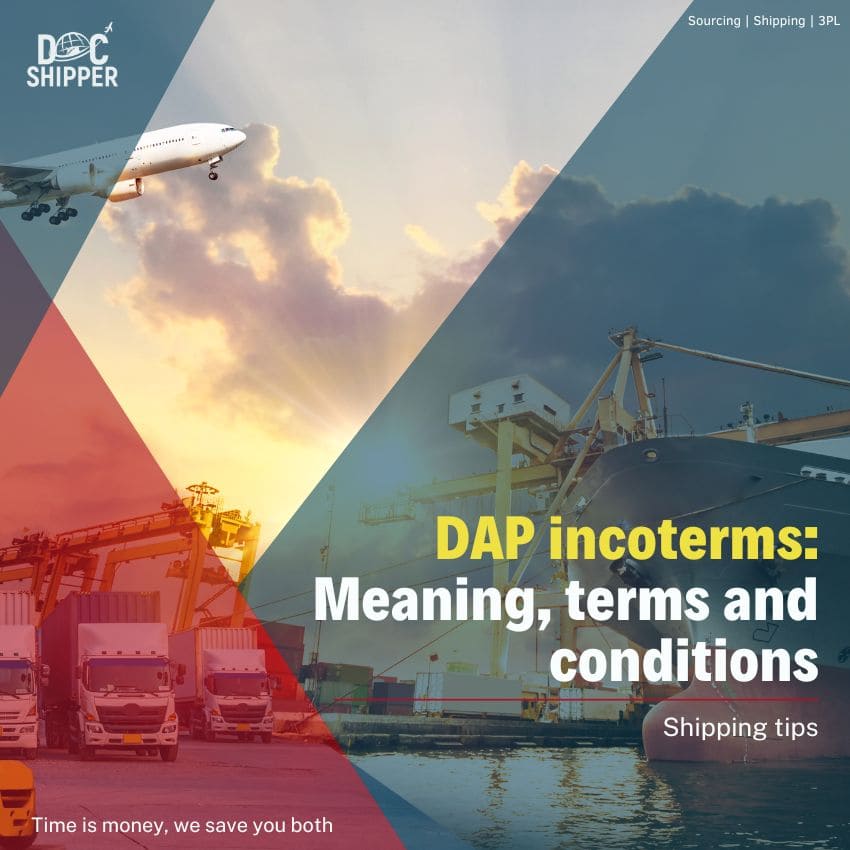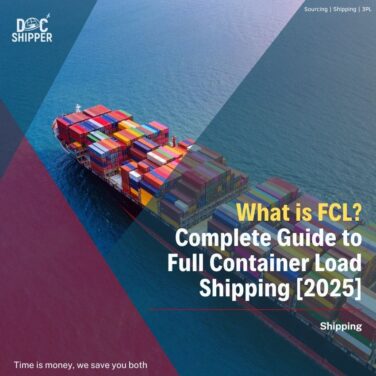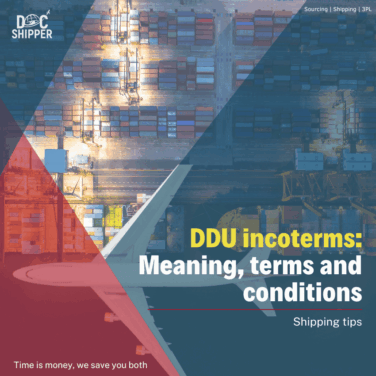DAP (Delivered At Place) incoterms are employed by sellers who want to strengthen their competitiveness by offering seamless logistics management up to the destination for their customers. They also present a good option for buyers who prefer a burden-free logistics process, allowing them to focus on growing their business.
What exactly are DAP incoterms, what do they entail, and when do you use them? Let’s find out!
What does DAP mean?
Incoterms are published by the International Chamber of Commerce (ICC), which revises and updates them every ten years.
DAP, which stands for Delivered At Place, is an incoterm used for all modes of transportation.
Under a DAP Agreement, the seller is responsible for delivering the goods to the final destination. He also bears all risks and costs involved in this matter. As for the buyer, he is only responsible for unloading the goods at the designated final place and for the import clearance.
The reason why they are used is because of their simplicity and convenience.

Siam Shipping Info
SIAM Shipping info: SIAM Shipping helps with document preparation and offers a customs clearance service. To ensure the project’s feasibility, we carefully review the entire bundle of documents for every shipment we handle. Contact us via WhatsApp, and receive a free quote in less than 24 hours.
What are the buyer’s and the seller’s responsibilities with DAP?
When using DAP Agreement, the seller has more obligations than the buyer. Let’s examine the responsibilities of both parties.
Seller’s obligations under DAP:
- Manage the goods from the origin point to the expedition shipping terminal (port, airport, etc.): this includes their packaging, labeling, loading onto a local carrier, transportation and delivery to the expedition location;
- Handle the export clearance, which includes export duties, taxes, and customs clearance;
- Unload the goods at the shipping terminal and load them onto the container or main carrier used for delivery to the destination terminal, then pay the Origin Terminal Handling Charges (OTHC) and the shipping freight;
- Unload the goods once they reach the destination terminal and transfer them to a local carrier used for delivery to the final warehouse/location, then pay the Destination Terminal Handling Charges (DTHC);
- Transport and deliver the goods to the final place.
The seller is responsible for any risk of loss or damages to goods that might occur during these steps, more specifically until before unloading of the goods at the final place.
Buyer’s obligations under DAP:
- Unload the goods at the final destination;
- Handle the import clearance, which includes import duties, taxes, and customs clearance.
Note that each DAP Agreement can differ if the contractual clauses are customized. For example, the seller can be responsible for the unloading of the goods at the final location/warehouse if it is specified in the contract.
When to use DAP Agreement?
Using DAP Agreement can be a good option for both seller and buyer because each agreement can be different according to the contractual clauses possible. These are negotiated between both parties and can be related to the place and timing of delivery, the packaging and labeling, additional services, insurance, and more.
Note that the seller is not required to include freight insurance in the contract, but it is a possibility.
It would be interesting to use DAP incoterm in the following situations:
- When you are a new importer or not familiar with the country you are working with;
- When the seller has a good network and is experienced: with access to competitive freight rates and the cost of DAP Agreement, which is more expensive, the seller can ensure an increase in his cash flow;
- When the buyer wants to optimize his cash flow, which can be done through a contractual clause specifying that the buyer can pay upon delivery of goods at the final place, and not before.
- When the final destination is a warehouse, making it easier for the buyer.
Siam Shipping Tip
SIAM Shipping Advice : Using DAP incoterm can be expensive. To get the best deal possible, we advise you to compare the price with CIF (Cost Insurance & Freight) or FOB (Free On Borard) rates.
Do you still have concerns about how incoterms work and which one to use for your import & export activities? Do not hesitate to contact us via Whatsapp or request a free shipping quote.
FAQ | Articles title
Read more
Looking for more? These articles might interest you:
SIAM Shipping info: Do you like our article today? For your business interest, you may like the following useful articles :
Need Help with Logistics or Sourcing ?
First, we secure the right products from the right suppliers at the right price by managing the sourcing process from start to finish. Then, we simplify your shipping experience - from pickup to final delivery - ensuring any product, anywhere, is delivered at highly competitive prices.

Fill the Form
Prefer email? Send us your inquiry, and we’ll get back to you as soon as possible.
Contact Us








